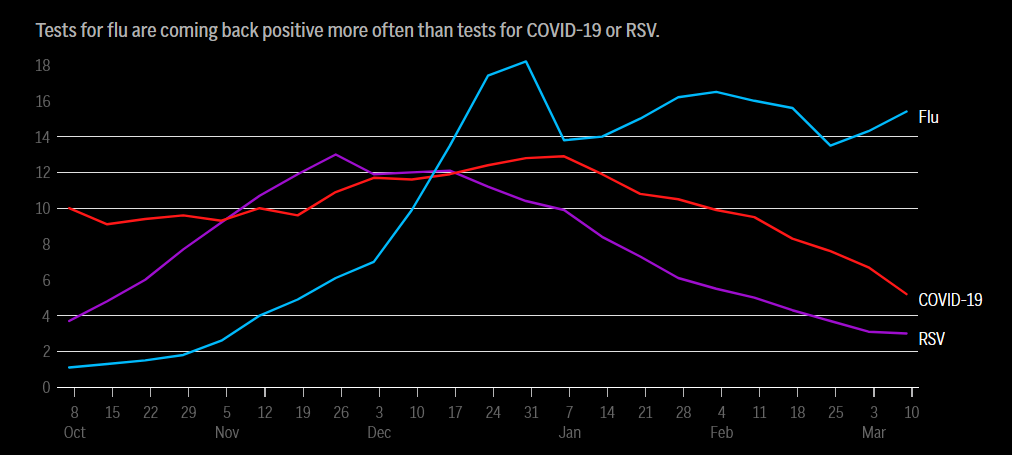Twitter is depressing, extending the diabetes honeymoon, more inhaler coupons coming, and more
19 Mar 2024
Posted by Andrew Kantor
D2 is for diabetes
When someone is diagnosed with type-1 diabetes, they often still have functioning pancreatic beta cells that keep working for years. They’ve got a “honeymoon period” before full-on diabetes sets in — time to make lifestyle changes to try to keep the diabetes at bay.
Just like with marriage or a new job, being able to extend that honeymoon is a Good Thing, and a group of researchers (from too many institutions to list) think they’ve found a pill that will do it: ergocalciferol, aka vitamin D2.
They ran a trial on 36 kids who had just been diagnosed and…
… found that those volunteers given the vitamin D2 supplements saw improvements in insulin secretion capacity in beta cells—they observed decreases in the PI:C ratio compared to a placebo.
Of course the trial was small (more research is needed), but considering that vitamin D3 gets all the love, it might be a chance for D2 to shine.
Apnea drug for mouth breathers
As much fun as it is to wear a CPAP and make Darth Vader sounds*, Aussie researchers may have found a pharmaceutical solution. It’s a potassium channel-blocking nasal spray that has “the potential to increase the activity of the muscles that keep the upper airway open and reduce the likelihood of the throat collapsing during sleep.”
They started with a small test — 10 volunteers — and got some good results:
Seven out of the 10 people responded to the potassium channel blocker nasal spray showing a reduction in the frequency of upper airway collapsing episodes during sleep and lower blood pressure the next morning.
Side note: With nasal-only breathing (we presume they taped shut the mouths of some volunteers), the spray didn’t help.
* Or mimic Bane’s voice, for you Dark Knight fans
Short takes
First drug for MASH (aka NASH)
The FDA has approved Madrigal’s Rezdiffra (resmetirom, to be technical) as the first drug ever for metabolic dysfunction-associated steatohepatitis (MASH), aka liver inflammation.
AZ offers more inhaler coupons
Following in the footsteps of Boehringer Ingelheim, AstraZeneca now says it’s also going to offer a savings program so no one has to pay more than $35 a month for any of its asthma inhalers.
This isn’t the same as lowering the price — perish the thought! — rather the company is making coupons available. Whether pharmacists and patients will be aware of those coupons … well, that’s another matter. As we’ve seen with insulin, it’s not even close to 100%.
More drugs in shortage
FYI, nine more drugs are in shortage (other than the ones you probably already know about) according to suppliers:
- Acyclovir injection
- Cyclopentolate and phenylephrine ophthalmic solution
- Estradiol vaginal system
- Flumazenil injection
- Mesna injection
- Naltrexone hydrochloride tablet
- Progesterone vaginal insert
- Succinylcholine injection
- Vasopressin injection
Experts: Don’t trust biome tests
We know that your various microbiomes are important, and that there are “good” and “bad” bacteria living in and on you, but the details are still being sussed out. Which bacteria are important for which people in which nooks and crannies is not 100% clear.
But that doesn’t stop nefarious companies from offering at-home tests to tell you whether a particular biome is healthy or not … and, of course, selling you something to “fix” it.
Thus a group of medical and pharmaceutical researchers has written an article in Science calling for more regulation of those tests, lest consumers be “financially exploited or harmed by inappropriate use of test results that neither they nor their doctors understand.”
“There is no scientifically agreed-upon definition of a ‘healthy’ microbiome; the microbiome is dynamic and changes frequently; there is no clinical proof that these products work; and no standardization in the processes involved.”
Respiratory update
What’s the current respiratory virus situation? Here, have a chart:

Captain Obvious has dusted off his Tumblr account
“Using X (formerly Twitter) has a negative impact on well-being”
“…it was associated with an immediate drop in positive emotions such as joy and a surge in outrage, political polarization, and boredom.”
The Long Read: Postpartum med remains elusive
Way back in August 2023 we told you how the first pill for postpartum depression — Zurzuvae (aka zuranolone) — got FDA approval and would be hitting pharmacies soon.
Well that happened, but there’s a catch. Sage Therapeutics set Zurzuvae’s price at $15,900 for the 14-day regimen. And that means insurers are iffy about covering it or even offering guidance. Meanwhile, patients are waiting.


